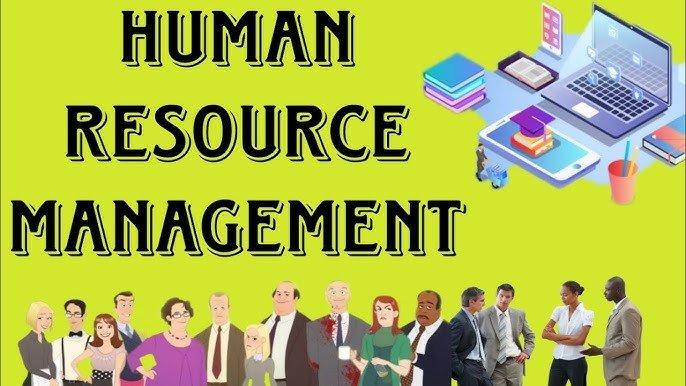Human Resource Management, or HRM, is all about managing a company’s greatest asset—its people. Think of HRM as the guiding force behind how a company recruits, trains, and supports its employees. It’s more than just processing payroll or handling disputes. HRM is about creating an environment where employees can thrive and contribute to the organization’s success. In simple terms, HRM is the bridge between employees and management, ensuring everyone is aligned toward achieving common goals.
Why is Human Resource Management Important?
You might be wondering: why is HRM so crucial for a business? Without effective HRM, an organization would struggle to find the right talent, manage employee relations, and maintain a positive workplace culture. HRM plays a vital role in hiring the right people, ensuring they are well-trained, and fostering an environment that encourages growth and development. A strong HRM strategy leads to better productivity, improved employee satisfaction, and ultimately, a more successful business. After all, happy employees equal happy customers, right?
How Does HRM Work?
So, how exactly does HRM function within a company? It begins with recruitment, the process of finding and attracting top talent. But it doesn’t stop there. HRM is responsible for onboarding and training, ensuring employees are set up for success from day one. Beyond that, HRM manages performance reviews, career development, and even employee well-being. It’s a continuous process that keeps the workforce engaged, motivated, and aligned with the company’s goals. Imagine HRM as the engine that keeps the entire organization running smoothly.
Objectives of Human Resource Management
HRM isn’t just about hiring people; it’s about creating a thriving workplace. The main objectives include:
- Attracting Talent: Finding and recruiting individuals who align with the company’s vision and values.
- Employee Development: Offering training programs that help employees grow in their roles.
- Performance Management: Regular feedback and evaluations to ensure employees are on the right track.
- Compensation and Benefits: Offering competitive pay and benefits to retain top talent.
- Building Strong Employee Relations: Maintaining a positive workplace culture where employees feel valued and heard. By focusing on these objectives, HRM helps a company build a workforce that’s engaged, productive, and loyal.
Key Skills and Responsibilities of an HR Manager
Being an HR manager requires more than just technical knowledge; it’s about people skills. HR managers need to be effective communicators, able to mediate conflicts and solve problems quickly. They must also be strong decision-makers, ensuring that company policies are fair and aligned with legal regulations. Additionally, an HR manager is responsible for creating a positive work culture where employees feel supported. From handling sensitive issues like workplace disputes to managing performance reviews, HR managers wear many hats. But at the heart of it all is their role in maintaining a harmonious, productive workplace.
The Role of HRM Software
In the digital age, HR managers aren’t just relying on pen and paper anymore. Enter HRM software—a powerful tool that streamlines various HR tasks, making everything from payroll to performance tracking much easier. Programs like BambooHR and Workday offer solutions that allow HR managers to automate repetitive tasks, freeing up their time for more strategic initiatives. Imagine trying to manually track the attendance, benefits, and performance of hundreds of employees—HRM software does this in a few clicks. It’s a game-changer for HR departments, especially in larger organizations where managing personnel can quickly become overwhelming.
Career Opportunities in HRM
If you’re thinking of a career in HRM, you’re in for a rewarding experience. The field offers a wide range of opportunities, from HR assistants to HR directors, depending on your qualifications and experience. Most HR roles require a degree in human resources, business, or a related field. Additionally, certifications like those from the Society for Human Resource Management (SHRM) can give you an edge. As the HR landscape evolves, HR professionals with skills in data analytics and HR technology will be in high demand. Whether you’re just starting or looking to climb the HR ladder, the future in HRM looks bright.
A Brief History of HRM
You might be surprised to learn that HRM has been around for a long time. Back in the early 20th century, as businesses grew and became more complex, there was a need for dedicated personnel to manage workers. This was the beginning of what we now call HRM, although back then it was primarily focused on administrative tasks like payroll and compliance. Over time, HRM has evolved to become a strategic partner in organizations, focusing on employee development, culture, and alignment with business objectives. Today, HRM is seen as a critical driver of organizational success.
Emerging Trends in HRM
HRM is not immune to change—there are several trends shaping the future of human resource management. First, there’s the rise of remote work. As more companies embrace flexible work arrangements, HRM practices must adapt to manage a distributed workforce. Second, there’s a growing emphasis on mental health and well-being, with many companies offering programs that support employee wellness. Another trend is the increasing focus on diversity and inclusion. HR managers are tasked with creating environments where everyone, regardless of background, feels welcome. Lastly, HR analytics is on the rise, allowing companies to make data-driven decisions about their workforce.
Can Small Businesses Benefit from HRM?
Absolutely! While HRM is often associated with large corporations, small businesses can benefit just as much—if not more—from implementing solid HR practices. Whether it’s hiring the right employees, managing benefits, or ensuring compliance with labor laws, small businesses can gain a competitive edge through effective HRM. And thanks to affordable HRM software solutions tailored to small businesses, it’s easier than ever to manage these processes efficiently. So, even if you’re a startup or a small operation, investing in HRM is a smart move for long-term growth.
Read More: Ibomma Telugu Movies Free Download: Trending Releases in 2024
Conclusion
Human Resource Management (HRM) is the heart of any organization, whether big or small. It plays a crucial role in hiring, developing, and retaining talent, while also ensuring that employees feel motivated and valued. In today’s fast-paced world, HRM is evolving to meet the challenges of a diverse workforce, remote work environments, and emerging technologies. By focusing on the well-being of employees and aligning their goals with the company’s objectives, HRM ensures the long-term success of a business. So, whether you’re a small business owner or part of a large corporation, investing in solid HRM practices is essential for creating a thriving workplace.










